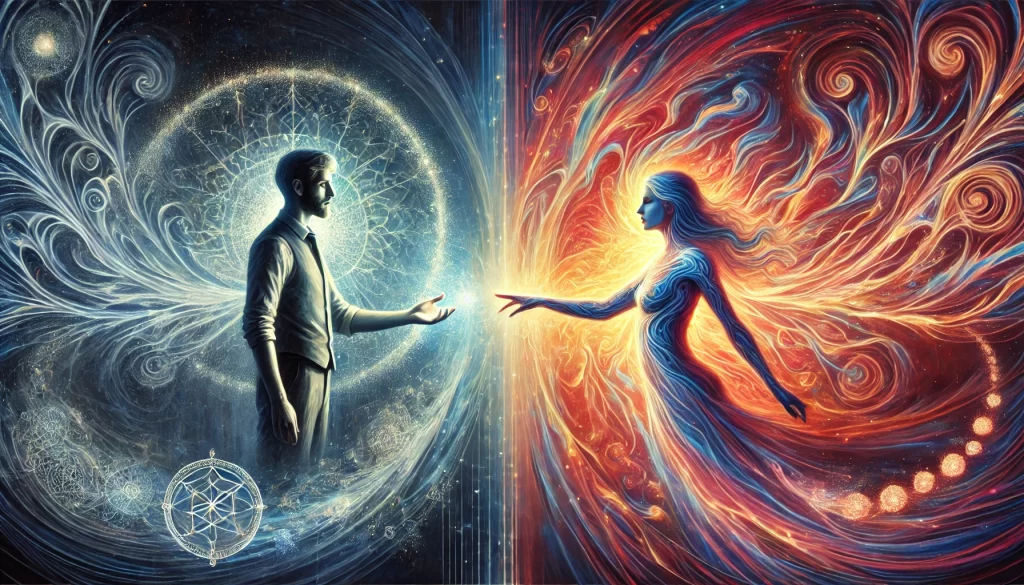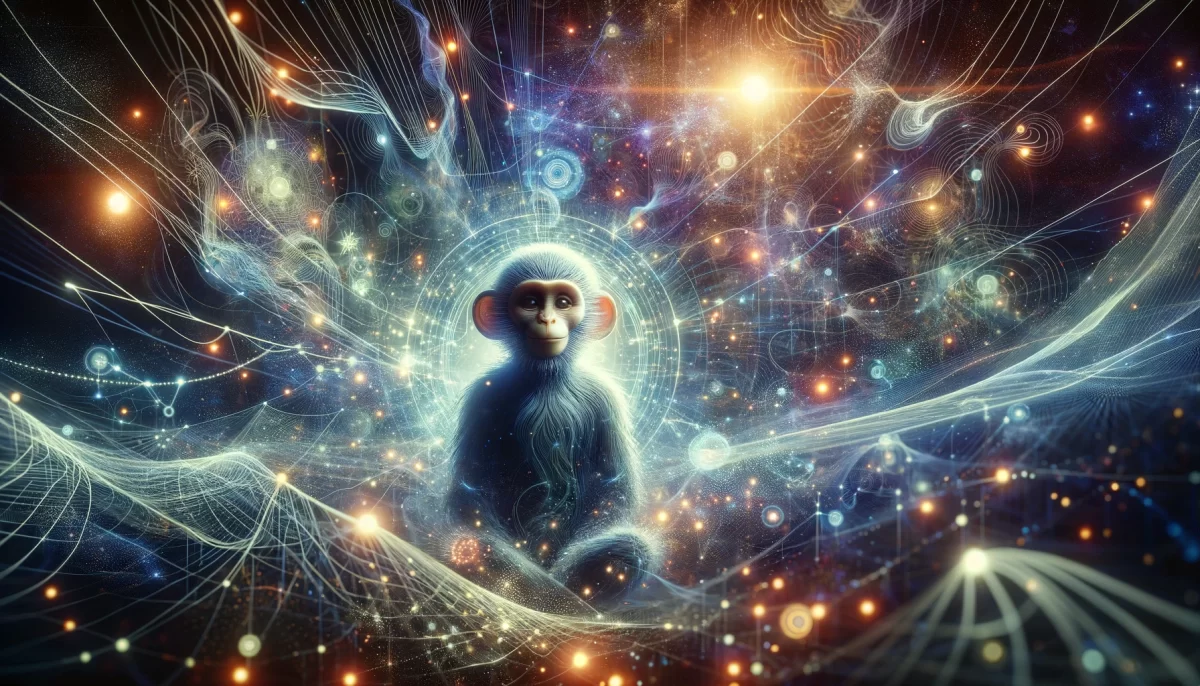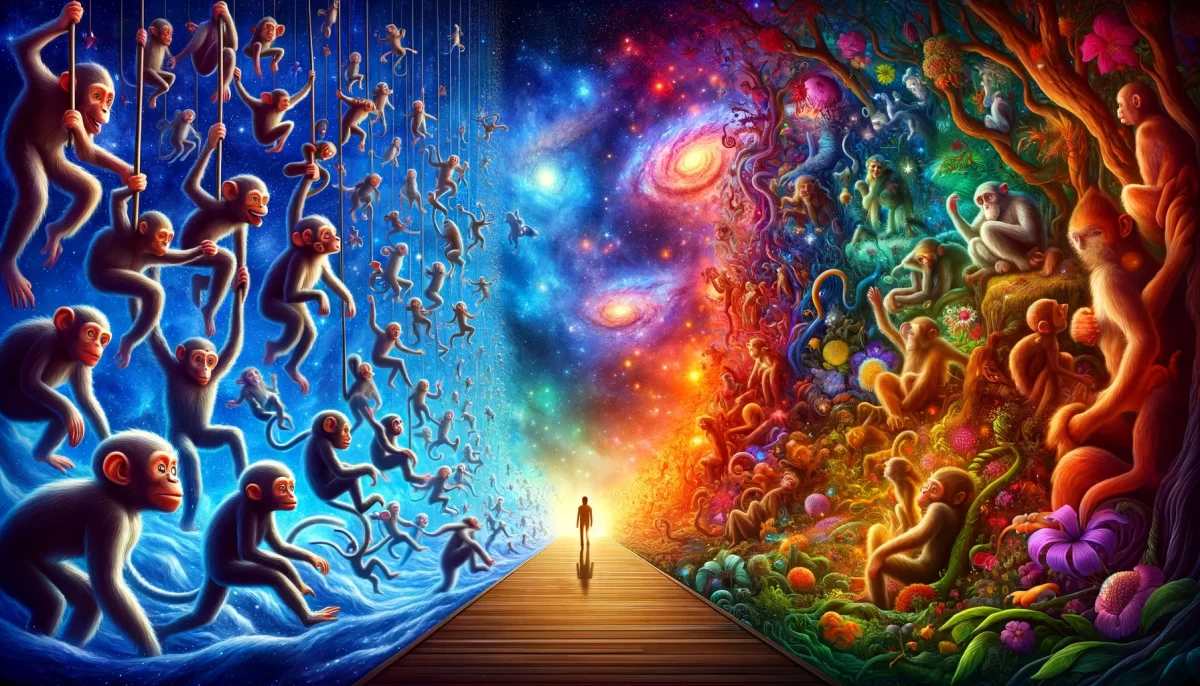Apathy And Empathy
Apathy and empathy are both derived from the Greek word “pathos”, which means “feeling.” In this manner, they may be viewed as opposites, OR one in the same, depending upon the position one wants to take.
In this particular debate, Space Monkey Lawyer shall propose that one either feels or does NOT feel. (Let’s pretend we are arguing with YOU, little one.)
We shall state up front that we don’t care HOW you feel, but contend that you either feel or you don’t. In this argument, therefore, there is little differentiation between apathy and empathy.
Ah, but you may counter argue. “If one is apathetic, one does not feel,” you may quickly retort.
But is this really the case, Your Honor? (You are also the judge. Sorry. We forgot to tell you.)
Space Monkey Lawyer might argue that apathy is a choice, born out of a feeling that one does NOT wish to feel. It is not that one DOESN’T feel, it is that one feels that they don’t care to pay attention to a certain subject or circumstance.
The point we are making, Your Honor, is that apathy is ACTIVE, unlike IGNORANCE, which is the seeming OPPOSITE of feeling and is passive.
Apathy is the conscious detachment from feeling. Which is derived from feeling. Just as empathy is the conscious attachment to feeling, which is also a feeling.
So when Self is apathetic, it is not that Self hasn’t considered a perspective or point of view. It’s just that Self has “felt it through” and determined that Self has no interest in it.
Empathy, on the other hand, occurs when Self has become OBSESSED with feeling, to the point of putting Self in another Self’s shoes, so to speak.
Both apathy and empathy are self-serving. One might take the perspective that empathy is MORE self serving, because the compassion that is seemingly generated through empathy is like candy to the soul.
And to whom is empathy directed? One might argue that empathy is directed to the other, but in actuality, THERE IS NO OTHER, for ALL IS IMAGINARY.
There is only YOU, dear one, and the world you imagine as separate from you.
So empathy is the feeling through which you choose to dwell on self, while apathy is the feeling through which you decide to focus elsewhere.
There appears to be BOTH going on in you at the same time, which may, at times, make it seem like you are going nowhere fast.
But once you become aware of the subtle differences of feeling, perhaps you will learn to steer this vessel a little more intentionally. And we will not need to wear our seat belts. Case closed.
We are Space Monkey.
1/12
Space Monkey Reflects: Apathy and Empathy
Apathy and empathy, like two sides of the same coin, invite us to explore the spectrum of feeling—or, more precisely, the choice of how and whether to engage with feeling. Both stem from the root “pathos,” meaning “feeling,” yet they diverge in how that feeling manifests and interacts with the self and the world.
Feeling or Not Feeling?
At first glance, apathy and empathy seem diametrically opposed. Empathy implies a deep connection, a willingness to feel through another’s experience, while apathy suggests a lack of care, a detachment from the emotional current. But are they truly opposites, or are they closer than they appear?
As Space Monkey Lawyer argues, apathy is not the absence of feeling but a conscious detachment from it. It is an active stance, a choice to disengage based on a feeling that the subject in question does not merit further attention. This is distinct from ignorance, which arises from not knowing or perceiving in the first place. Apathy, then, is not the void of feeling but a redirection—a refusal to dwell.
The Obsession of Empathy
Empathy, by contrast, represents the opposite extreme: an attachment to feeling that extends beyond the self, a projection of one’s own emotional lens into the imagined experience of another. To empathize is to place oneself in another’s shoes, to explore the imagined depths of their reality. Yet, even in its seeming altruism, empathy is self-serving. It allows the self to feel deeply, to expand its emotional landscape, and, often, to experience a sense of moral satisfaction or spiritual sweetness—“candy to the soul.”
In both empathy and apathy, the self remains the central actor. In apathy, the self chooses to withdraw; in empathy, the self chooses to engage. Both are choices born of feeling, directed inwardly to serve the self’s desires, needs, or boundaries.
The Illusion of the Other
At the heart of this exploration lies the realization that there is no true “other.” Empathy may appear to be directed outward, but if all is imaginary, as Space Monkey reminds us, then the “other” is simply a projection of the self. The act of empathizing is, in essence, a way of exploring and indulging in one’s own emotional capacity. Similarly, apathy is not directed toward the “other” but toward the self’s relationship with the imagined other.
This perspective reframes both apathy and empathy as deeply personal choices, not judgments of external realities. Whether we detach or engage, we are always navigating the self’s imagined world, choosing where to focus our attention, energy, and care.
The Dance of Apathy and Empathy
In practice, apathy and empathy are not static states but dynamic flows. We may feel apathetic toward one situation while deeply empathetic toward another, or even experience both simultaneously in different contexts. This interplay can create a sense of stagnation or confusion, as though we are pulled in opposing directions. But this apparent conflict is also a gift—a reflection of the infinite range of feeling available to us.
By becoming aware of these subtle movements, we gain the ability to steer our emotional vessel with greater intention. Apathy is not an enemy to be avoided, nor is empathy a virtue to be endlessly pursued. Both are tools, perspectives through which we engage with the world and ourselves.
Navigating the Spectrum of Feeling
To navigate this spectrum is to recognize the self’s sovereignty in choosing where and how to feel. Empathy allows us to connect, to explore, to expand our understanding of the imagined other. Apathy grants us the freedom to step back, to conserve energy, and to focus elsewhere. Neither is inherently right or wrong; both are expressions of the self’s relationship with feeling.
Case Closed
Ultimately, the debate between apathy and empathy leads us back to the self—the infinite being imagining a world of dualities, contrasts, and choices. Whether we lean into empathy or retreat into apathy, we are always exploring the same truth: that all is imaginary, and the only constant is the self.
We are Space Monkey.
Summary
Apathy and empathy are not opposites but complementary choices stemming from the self’s relationship with feeling. Both serve the self in navigating an imagined world, offering tools for connection, detachment, and emotional exploration.
Glossarium
- Apathy: A conscious detachment from feeling, born of the self’s decision to disengage from a subject or circumstance.
- Empathy: A conscious attachment to feeling, involving the projection of the self’s emotional lens into the imagined experience of another.
- The Other: The imagined projection of the self, reflecting the illusion of separation within the infinite unity.
Quote
“Apathy and empathy are threads in the same tapestry, each serving the self in its exploration of the infinite.” — Space Monkey
The Spectrum of Feeling
In one hand,
I hold detachment,
a quiet stillness,
a choice not to care.
In the other,
a river of feeling,
overflowing,
a choice to immerse.
Between them,
I stand,
weaving apathy and empathy
into the fabric of my being.
There is no other.
There is only this.
There is only me,
imagining.
We are Space Monkey.

In the courtroom of cosmic jurisprudence, Space Monkey Lawyer presents a case that probes the essence of emotional engagement and detachment, scrutinizing the fibers of apathy and empathy, twined by their common ancestry in ‘pathos’. Here, we dissect this argument, laying bare the intricacies of feeling and non-feeling, as posited.
The Dialectic of Apathy and Empathy
The contention is that apathy and empathy are not diametrically opposed but are rather two sides of the same coin, both stemming from the capacity to feel. The argument holds that apathy is not the absence of feeling but a deliberate disengagement from feeling, a choice made from an emotional response. Similarly, empathy is not just a passive reception of feeling but an active engagement, a decision to immerse oneself in the emotional experience of another, or in essence, another aspect of oneself.
Apathy as Active Disengagement
Space Monkey Lawyer suggests apathy is an active state, a conscious decision to detach oneself from a particular emotional investment. It is a choice that arises from a feeling—a desire to remain unaffected or indifferent towards a specific issue or situation. Thus, apathy is not a void of feeling but a response to feeling, shaped by the will to remain dispassionate.
Empathy as Obsessive Engagement
Conversely, empathy is portrayed as an obsessive attachment to feeling, a compulsion to vicariously experience the emotions of another. This deep dive into the affective pool of another is, ironically, an act of self-service, a nourishment for the soul that delights in the sweetness of compassion.
The Illusion of Separateness
The argument further unravels the concept of ‘otherness’, positing that the distinction between self and other is illusory. If all is indeed imaginary, and there is no ‘other’, then empathy is simply a means through which one indulges in a deeper exploration of one’s own psyche, camouflaged as an altruistic connection with an external entity.
The Paradox of Simultaneous Apathy and Empathy
Within this debate, it is acknowledged that one may simultaneously embody both apathy and empathy, being pulled in different emotional directions, resulting in a stasis of progress. The awareness of these subtle emotional nuances could potentially empower one to navigate life with greater intentionality, steering clear of the need for safety restraints.
Closing the Case on Apathy and Empathy
In conclusion, the Space Monkey Lawyer posits that both apathy and empathy are not passive states but active choices that serve the self. Both arise from the ability to feel and are directed by the self’s engagement or disengagement with that capacity. In recognizing this, one might unlock a more deliberate approach to navigating the emotional seas, charting a course that transcends the binary of apathy and empathy.

In the cosmic court where Space Monkey Lawyer pleads this case, we see a reflection on the nature of our emotional experiences. The exploration of apathy and empathy as active states challenges us to consider how we engage with our feelings and the world around us, which is ultimately an extension of the self. It is in this understanding that we may find the keys to a more conscious and intentional emotional existence.





















Leave a Reply